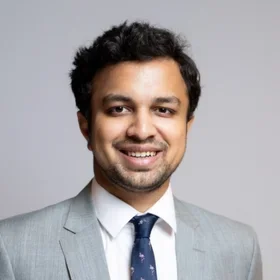By Frances Schmidt, Alumna of the M.P.S. in Wealth Management Program, School of Professional Studies
Starting my career in the financial industry later than most, I became passionate about deepening my knowledge and expertise through higher education. The M.P.S. in Wealth Management program at Columbia University School of Professional Studies (SPS) immediately resonated with me. The comprehensive curriculum, which includes everything from investment management to estate planning, allowed me to not only fulfill the CFP® education requirement but also feel confident about venturing into the field after graduation and beyond.
Most of all, I recall the diverse, tight-knit community I was able to find in my time at Columbia. Each one of us brought a unique insight, and it truly enriched the collective learning experience. The relationships I was able to build with my cohort, the lecturers, and alumni have empowered me in my own professional journey and have also encouraged me to give back to the community with all the insights I have gained.
Having navigated the path to earn the CFP® certification, I can attest that this designation represents a significant investment in professional growth and a powerful commitment to serving clients with excellence. To help others on this journey, I’ve compiled some essential tips gleaned from my own experience preparing for the CFP® exam.
1. Comprehensive Research: Before you dive into study mode, gather information about the CFP® exam and determine whether this designation is what you are looking for. The CFP Board’s website (https://www.cfp.net/) is a treasure trove of resources that provide you with information about the designation along with what the CFP® exam entails. There are four certification requirements in receiving the designation that you should be familiar with: education, exam, experience, and ethics.
Another great resource provided by the CFP® website is the multiple scholarships and grants that help with the financial burden of the coursework and the exam. If you are currently working in the financial industry, you will want to ask your employer whether they provide financial assistance in getting the designation.
2. Select the CFP Board Registered Program That Best Suits Your Needs: One of the requirements before taking the CFP® exam is fulfilling one part of the educational requirement: completing coursework on financial planning through a CFP Board Registered Program.
You will want to evaluate the different CFP Board Registered Programs and choose the one that aligns with your learning style and professional goals. For example, not only is the Columbia SPS Wealth Management program a CFP Board–Registered Program, but it also provides real-world wealth management experience and you earn a Master’s degree at the same time. The program is taught by professors who have extensive applied experience in their respective fields.
3. Enroll in a CFP® Review Course after Completing the Educational Requirement: The key to successfully preparing for the CFP® exam is choosing a review course that will guide you through the exam. With a variety of courses available, it is best to find one that suits your learning style.
When you’re enrolled in the course, consistency is important. Personally, I found success in setting aside time early in the morning to read and complete practice questions; after work, I focused on flashcards. After receiving the materials, create a schedule that you can follow, and stick to it!
Additionally, the CFP Board provides you with a sample practice test when you register for the exam. When you take the practice exam, you should mimic how it would be if it were the real thing. Familiarizing yourself with the actual test will help reduce anxiety and prepare you for exam day.
4. Register for the CFP® Exam: Once you have completed your educational requirement and chosen your CFP® review course, it’s time to officially sign up for the exam! There are several testing windows available: November, March, and July. After enrolling in a review course, be sure to choose a date that allows you to complete the review course beforehand.
You have two options for where you can take the exam: at a physical testing center or at home, with a remote proctored exam. If you choose to take the exam at home, ensure you are in a quiet area with no interruptions and have a strong internet connection.
5. Rest and Preparation Ahead of Exam Day: Throughout your studying, you should prioritize your sleep. Good sleep enhances memory and focus, which will better prepare you for exam day.
I recommend taking a day or two off before your exam date to help yourself recharge. If you cram at the last minute or try to learn new formulas the day before, you may increase your anxiety and lose focus. In addition, the night before the exam, you should have all your materials—your ID, directions, a calculator–—ready and know how long it will take you to get to the test center. Since there is a lunch break between sessions, you will want to pack up your lunch the night before to avoid any unnecessary stress.
Receiving your CFP® designation is undeniably challenging, but with structured preparation and rest, you can tackle it with confidence. It was a journey for me, but following these essential tips helped me immensely. You will gain invaluable knowledge for your continued growth in the financial planning industry. Good luck!
Views and opinions expressed here are those of the authors and do not necessarily reflect the official position of Columbia School of Professional Studies or Columbia University.
About the Program
A 16-month online program with asynchronous instruction, specially designed to accommodate working professionals, Columbia University’s Master of Professional Studies in Wealth Management program is taught by distinguished faculty with deep applied experience in their respective fields. Additionally, it is a CFP Board Registered Program designed to help students meet the educational requirement for CFP® certification.
Learn more about the program here.


